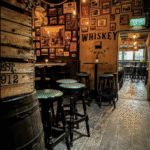Before the Brixton riots in 1981 and over a decade before Thatcher’s Section 28, Railton Road in south London was a hub of queer radicalism. In 1970’s Brixton, the gay community was shaking up heteronormative ideals by defying the grounds of private property and the nuclear family. Railton Road, nestled between Brockwell Park and Herne Hill, became a nexus for gay communities to practice progressive politics and communal living arrangements. This took place in several houses from 143 to 159 Railton Road back to back with 146, 148 and 152 Mayall Road. Eventually, there was the creation of a shared garden between most of them.

This month, Ian Giles and Louis Rembges, working under the company name ‘Brixton Pansies’, bring their staged production On Railton Road to Hoxton’s Museum of the Home. The show tells the story of a queer household of squatters resembling the wider community of gay squatters that made Brixton’s Railton Road a hub of activism during the decade. Amid a housing crisis – where homelessness was rife and yet thousands of properties in the city lay empty – activist groups set up communities and centres in the many dilapidated buildings in the street.
Defying heterosexual norms
The play unveils the intimate lives of the pioneers who lived through a significant moment in queer history. It portrays how they faced and navigated complex dynamics of sexual and social politics that challenged heterosexual societal norms. These communities saw perhaps 60 or so individuals pass through Railton Road in a period of a decade. Marking the Museum of the Home’s first staged production, the venue was the ideal location to perform this play in a stripped-down, community-focused environment.

Drawing on lived experience and Ian Townson’s archive of interviews with squatters that were conducted at the time of the play’s setting, this entertaining play fizzes with charisma and charm in a hilarious and striking show, from which the characters were brought to life with empathy, wit and humour.
Become a Nonchalant VIP for ad free browsing.
A play within a play
Casper wants to bomb WH Smiths. Daire wants to put on a play. Atom is naked in the garden on an acid trip. Ned just wants to be with Philip and live on Railton Road forever. Despite Casper’s violent desires, the creative approach to the group’s plans for anarchy wins as they try to find a way to express their political perspectives. The characters decide to stage a play within a play. Each scene is interjected by a short scene from Mr Punch’s Nuclear Family, an original play by the Brixton Faeries first performed in the mid-1970s which was based on Punch and Judy. The production enacts a tragic story of a nuclear family, in which violence towards emancipated women and gay people was justified. The Brixton Faeries consisted of Colm Clifford, Terry Stewart, Jim Ennis, and others living at Railton Road, where plays would be performed to engage with the local community.
Noteworthy cast members included Jamal Franklin’s energetic stage presence and hilarious comical shine as the flamboyant fur-coat-clad Dara. Jaye Hudson as Atom and their hilarious execution as Mr Punch’s Nuclear Family’s narrator, and Aoife Smyth particularly stood out in the production, both of whom executed hilarious and endearing roles which pleasantly surprised the enamoured audience as narrative drivers throughout, with Smyth leaving a lasting impression on the audience.
Article continues below.
The entire cast succeeded in delivering a brilliant and memorable play, particularly as the Museum of the Home offers limited theatrical production facilities with a lights-on approach in the room, meaning the actors could not hide behind fancy effects and lighting. Instead, their talents shone brighter at the centre of the room, with the assistance of excellent museum-worthy puppetry designed by Oliver James-Hymans.
Despite being quickly wrapped up, bringing several narrative threads to a hasty ending, the play is incredibly entertaining and tells a wonderful part of queer history in London that perhaps might otherwise become forgotten. The play promises wit and humour with laughs abound, sex scenes and satire, with an excellent ensemble cast delivering a night of fabulously inspiring entertainment. This is a sparkling story about homemaking, freedom and chosen family, who fought to be heard.

Celebrating intersectionality
While the play does very well to have a diverse cast and character representation of different genders with “gender and colour blind casting” noted in the programme, the play falls short in the noticeable lack of women characters. Of course, historically, the squats were inhabited by an overwhelming majority of gay men, according to Revolting Gays, “with lesbians preferring to be with other women and wary of a male-centered living situation, politics and unacknowledged male chauvinism.”
Squatting has been a huge part of lesbian history too, with the Rebel Dykes helping to establish women-only squats as well as the opening of the first fetish lesbian club in the 1980s. “As if they were erased from squat culture of the [1970s and] 1980s”, the Rebel Dykes are commonly attributed with the 1990s movements due to their ‘punky intersectional feminism.’ The writers could have seized an opportunity to acknowledge a wider audience had more (queer) women been included in the narrative, paying homage to the collective and intersectional efforts that were achieved in queer history, to help to build a more collaborative future.

Representation and resilience
At a time where the British media continues to vilify the trans community, and violence towards the LGBTQ+ community in Europe is at a decade-high, representation in plays, films and just about everywhere matters more than ever. Telling the stories of our history and celebrating the pioneers who won us our freedoms today will help to build a more equal and safer future, educating the ignorant while celebrating the resilience of queer joy. Upon watching On Railton Road, you will leave fondly with Railton Road’s prevailing phrase ringing in your ears, “Gay is Good!” The play is running from 3rd-18th November, and you can grab your tickets here.
And while you’re here, you can find out more about the incredible women who were a part of the Railton Road communities such as Olive Morris, who had relationships with both men and women, and Liz Obi, both of whom contributed significantly to activist causes and pioneered the British Black Power Movement in the 1960s and 1970s.
Let us know your thoughts in the comments! Meanwhile, made plans to see Bottoms yet? Find out where or how to watch it here.
Love Team Nonchalant xx




